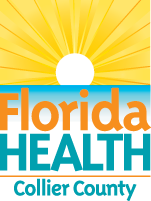It's a New Day in Public Health.
The Florida Department of Health works to protect, promote, and improve the health of all people in Florida through integrated state, county, and community efforts.
FLOOD WATER SAFETY
August 12, 2021
Naples, Fla. — Tropical Depression Fred is forecasted to strengthen to a Tropical Storm. As it moves through the state, heavy rainfall is expected. It is important to be prepared for issues related to flooding.
Moving Flood Water
During flooding, the greatest threat comes from moving water. The deeper the moving water, the greater the threat. People should avoid driving in moving water, regardless of the size of their vehicle.
Pooling Flood Water
Heavy rain causes flood waters to rise and pool on streets and throughout neighborhoods. In these situations, be aware of the following:
- Road surfaces become obscured, and drivers can unknowingly steer into a deep body of water, such as a canal or pond.
- Electricity from streetlights and power poles may be conducted through standing water, causing a deadly shock to anyone coming in contact with it.
- Children playing in contaminated standing water can become sick or be bitten by snakes or floating insects.
- People coming into contact with floodwater should thoroughly rinse any exposed body parts with soap and clean water.
Contaminated Water Supply
Drinking contaminated water may cause illness. Listen to local announcements on safety of the water supply.
If your public water system lost pressure, a boil water notice will likely be issued for your area. People in these areas should take precautions to avoid contaminated water, especially individuals with private wells. If your well is in a flooded area, your water may contain disease-causing organisms and may not be safe to drink.
DOH-Collier recommends one of the following:
*Boil the water before drinking, holding it at a rolling boil for one minute.
*Disinfect it by adding 8 drops (about 1/8 tsp – this would form a puddle about the size of a dime) of unscented household bleach per gallon of water and then let it stand for 30 minutes. If the water is cloudy after 30 minutes, repeat the procedure.
*Use only bottled water for mixing baby formula.
Contaminated Food
Do not eat any food that may have come into contact with flood water. Discard any food without a waterproof container if there is any chance that it has come into contact with floodwater. Undamaged, commercially canned foods can be saved if you remove the labels thoroughly, wash the cans, and then disinfect them with a solution consisting of 1/4 cup of bleach per gallon of water for clean surfaces. Re-label your cans, including the expiration date, with a marker. Food containers with screw-caps, snap lids, and home canned foods should be discarded if they have come in contact with flood water because they cannot be disinfected.
Contaminated Items
Discard wooden cutting boards, plastic utensils, baby bottle nipples and pacifiers. There is no way to safely clean them if they have come in contact with contaminated flood waters. Thoroughly wash metal pans, ceramic dishes, and utensils with soap and hot water and sanitize by boiling them in clean water or by immersing them for 15 minutes in a solution of 1/4 cup of household bleach per gallon of water.
Hygiene
Basic hygiene is very important during an emergency period. Always wash your hands with soap and water that has been boiled or disinfected and cooled before eating, after toilet use, after participating in cleanup activities, and after handling articles contaminated by floodwater or sewage.
About the Florida Department of Health
The department, nationally accredited by the Public Health Accreditation Board, works to protect, promote and improve the health of all people in Florida through integrated state, county and community efforts.
Follow us on Facebook, Instagram and Twitter at @HealthyFla . For more information about the Florida Department of Health please visit www.FloridaHealth.gov.




Connect with DOH